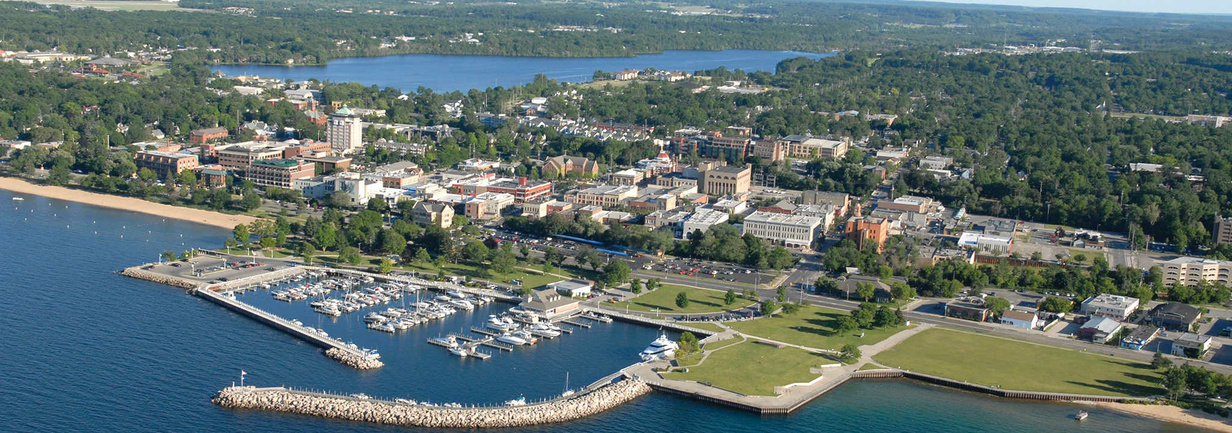
TC Certified As Redevelopment Ready, Starts Program For Biz Owners
By Beth Milligan | May 7, 2018
Traverse City has received its certification as a Redevelopment Ready Community (RRC) from the state of Michigan – a designation that qualifies the city for state technical support, marketing assistance, and grants and signals to investors the community is development-friendly. The awarding of the designation from the Michigan Economic Development Corporation (MEDC) coincides with the launch of a new program this week offering free guidance and support to city business owners, including exploring opportunities to add new housing or retail units to their properties.
State officials will formally present Traverse City with its RRC award tonight (Monday) at the Governmental Center at the beginning of the city commission's 7pm meeting. The designation indicates Traverse City has gone through required program steps to establish “a solid foundation to attract private investment and further build on municipality assets," according to the MEDC. The certification process included city staff participating in best practices trainings, creating a public participation plan for engaging community stakeholders on development proposals, incorporating a “good neighbor plan” that encourages developers to seek input from neighboring residents and businesses when developing projects, and adopting a community marketing strategy. Traverse City officials have been working on obtaining the RRC designation since 2014.
"Going through the RRC process felt a bit like getting an annual physical," says City Planning Director Russ Soyring. "The city was probed, poked, and questioned on how we communicate and engage with the public, how we handle development requests, and present ourselves to others. Overall, Traverse City was in pretty good health, but certification process brought to light a number of areas where we could improve our practices. Two areas in particular we have made changes (to). We formalized the steps we will take to involve the public on planning efforts and key developments, and we have developed a marketing plan that informs the developers of the type of community we want to be, versus the other way around."
Traverse City joins 17 other communities that are now considered “thoroughly prepared” when it comes to planning, zoning, and "other key features that remove traditional barriers and promote opportunities for prospective investors," according to the MEDC. Other certified RRC communities include Allegan, Battle Creek, Boyne City, Dearborn, Eastpointe, Escanaba, Ferndale, Kalamazoo, Lansing, Lathrup Village, Manistee, Marshall, Middleville, Muskegon, Roseville, Southfield, and Ypsilanti.
To help Traverse City in its effort to attract new business investment, the MEDC is funding a $25,000 contract with consulting firm Revitalize LLC to offer support and guidance to city business and property owners. The contract will pay for Revitalize Principal Bruce Johnston – an MEDC-certified grant administrator – to help Traverse City property owners evaluate their portfolios and business plans, identify opportunities in invest in underutilized properties, and apply for grants to the MEDC and other funding sources.
The city is particularly interested in encouraging owners to take underutilized upper floors of buildings – such as those along Front Street – and convert them into new residential or retail spaces. The proposed loft program is similar to one City Manager Marty Colburn oversaw while in Mason, where he estimates approximately three dozen grants were implemented to build downtown lofts in a 15-year period. Colburn approached the MEDC directly to request help launching a similar initiative in downtown Traverse City. With the city’s designation as an RRC, talks eventually expanded to include the whole city, not just downtown.
“(The MEDC) has expanded our ability to work citywide, so we could focus on corridors like Eighth Street and Fourteenth Street and Garfield (Avenue),” Colburn says. “Whether it’s adding a loft in a second or third floor downtown, or finding an underutilized lot in one of the corridors…(Johnston) is contracted by the state to work with businesses and see how we can help them move forward with investing in their properties.”
Johnston previously told The Ticker the MEDC has funding available to help business owners close the gap on projects in which they can’t fully afford the construction costs for new lofts. The MEDC could provide grants or loans – or both – to property owners for projects that create apartments that would be rented out below market rate. “They try to fill a gap that would be created between the cost of construction and what a bank loan would cover,” Johnston explained. “So if a project hypothetically cost $100,000, and you were able to show based off income and taxes you could get a loan for $70,000 and had $10,000 of your own money, then MEDC may come in and fill in that $20,000 gap. The goal is to make the projects make financial sense to both the city and property owners.”
The MEDC is looking specifically for projects that will create workforce housing and/or eliminate blight, according to Johnston. In workforce housing projects, at least 51 percent of the units created must be fair-market rent to start.
Johnston will host an introductory meeting for the program for any interested property owners Tuesday (May 8) in the commission chambers of the Governmental Center from 10am until noon.
Comment






